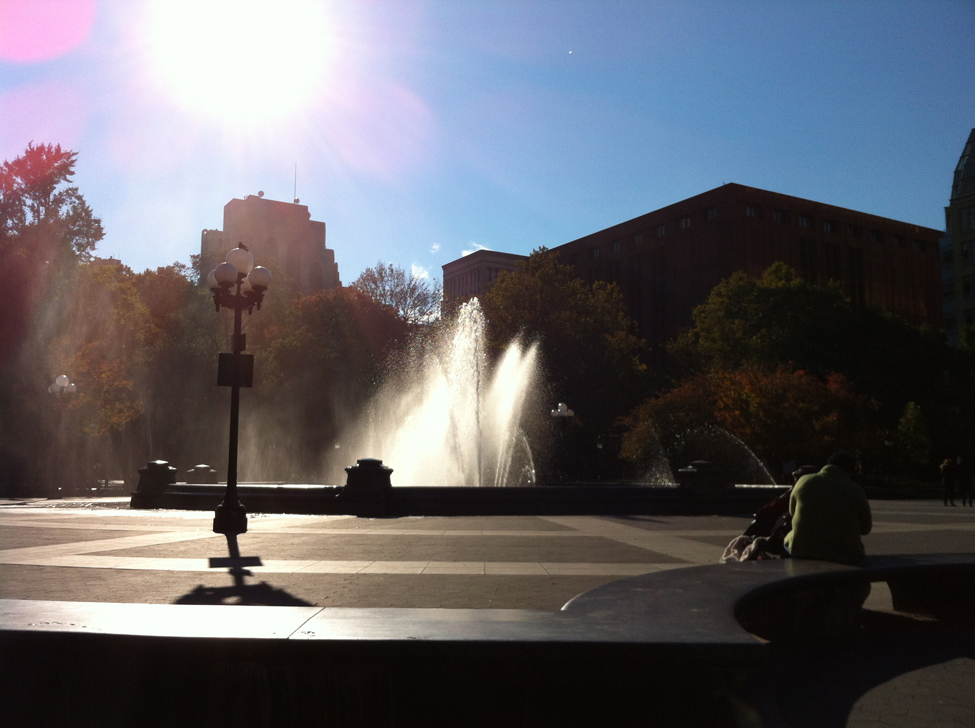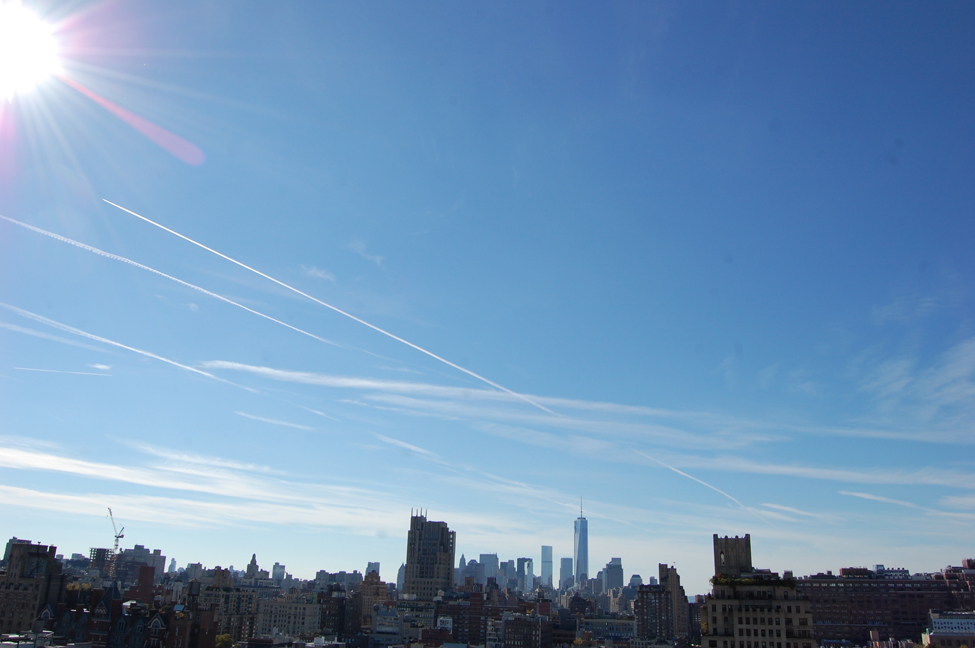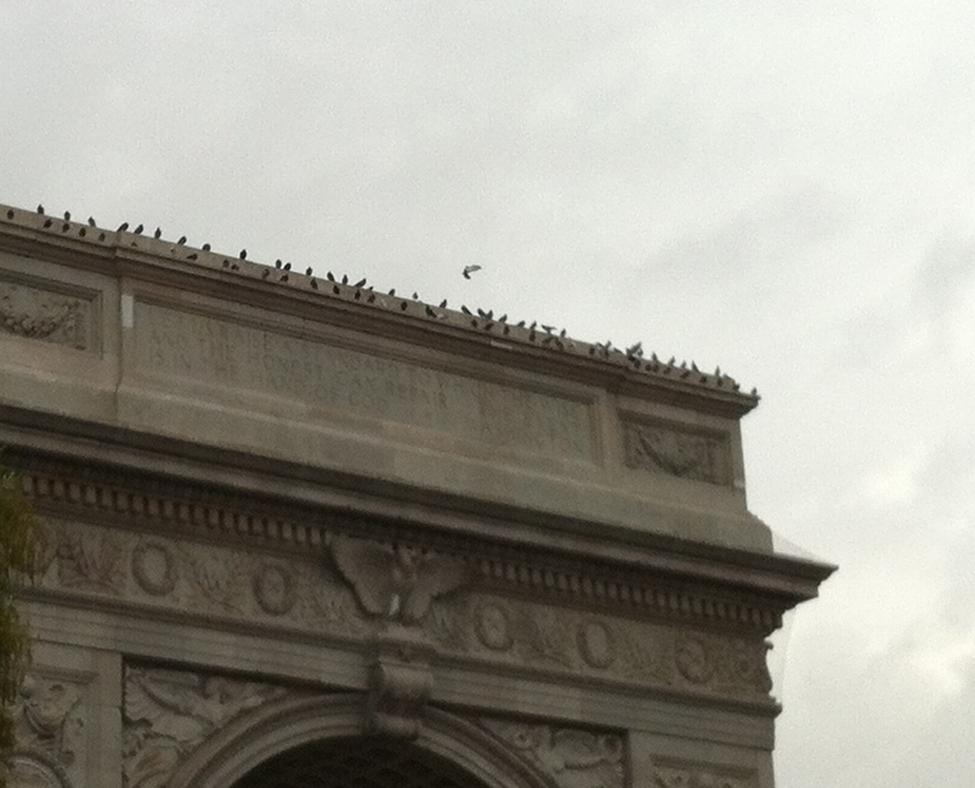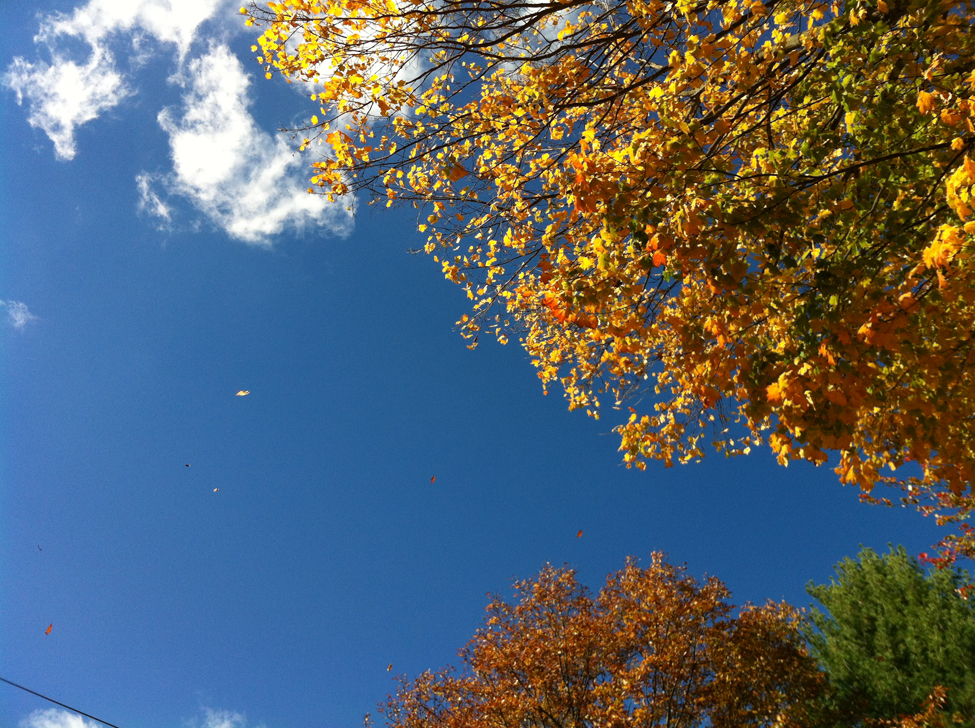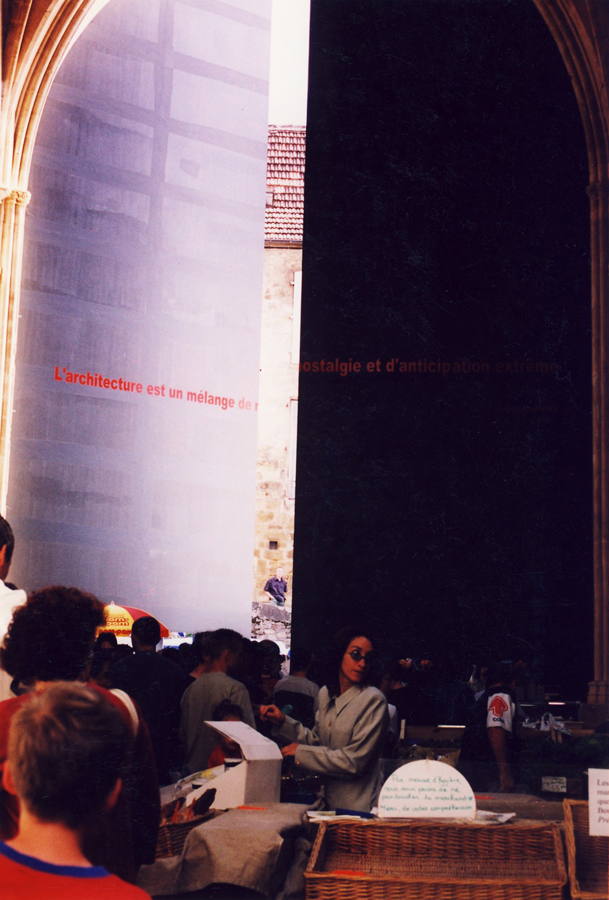
XVI
The Three Little Pigs: a distinct and discernible stage of capitalism.
Sustainable intentionality.
All droned up and noplace to go.
Adam misnames the animals.
Throw another logos on the fire.
What does the artist do but smuggle reality – and this is Baldwin’s formulation – through the pores of a carefully crafted, deeply invested, hence much protected social fantasy? Now the irony is that the artist may be just as deeply invested in the fantasy as anyone else, yet she must – if she is actually an artist – materialize in her work that irreducible grain from which a thousand truths may grow.
Put another way: art is the acupuncture of social life.
I’d just as leaf be the wind.
It was me.
If you stop keeping Kosher, is it a symptom of dishintegration?
Baldwin, to his agent Robert P. Mills:
Paris, September 15, 1961
I feel very strange and naked, but I guess that’s good. Appetite seems to be returning, and I’m able to work. And Paris is beautiful, in spite of its danger and sorrow and age.
Pray for me.
A ton of washing. Squared. Let George do it.
Soften the eyes, said Aaron Stiles. Anything can happen.
Come,
hear Uncle John’s Band,
by the riverside.
Got some things to talk about, here
beside the rising tide.
Come,
hear Uncle John’s Band,
playing to the tide.
Come on along or go,
alone.
He’s come
to take his children home.
Wrote Robert Hunter, oncet.
Meredith Hunter. Relation?
Zhang Zai, who, in the eleventh century worked toward a synthesis of Buddhist, Daoist and Confucian thought, described Qi as an ever-changing vital force that coalesces and disperses tangible forms.
When Qi condenses, its visibility becomes apparent so that there are then the shapes (of individual things). When it disperses, its visibility is no longer apparent and there are no new shapes. At this time of condensation can one say this is anything but temporary? At the time of its dispersing, can one hastily say that it is non-existent?
Cited in Bisio, Decoding the Dao, pp. 41-42.
Pathogeny, mon amour.
We, the West, have reached the point where Occam’s razor is used for nothing more than sweeping cocaine across a mirror.
The mothers. Them others.
Bronwyn Mills has guest-edited an issue of Absinthe, number 19, devoted to Turkish writing. In her lucid and informative introduction she quotes from Latife Tekin’s Swords of Ice (translated by Mel Kenne and Saliha Paker):
“Halihan Sunteriler was the first of the area’s poor who had been lucky enough to transform his sense of dispossession into the substance of a car. As the feelings this instilled in him set him apart from his fellow men in the neighborhood – that distant satellite ruled over by those fused with their possessions – people started to spin a yarn of epic proportions, based on Halihan’s car and his soft spot for women.”
A bibliography:
Vital Nourishment: Departing From Happiness by François Jullien, translated by Arthur Goldhammer. New York: Zone Books, 2007.
Decoding the Dao: Nine Lessons in Daoist Meditation by Tom Bisio. Outskirts Press, 2013.
The Cross of Redemption: Uncollected Writings by James Baldwin, edited and with an introduction by Randall Kenan. New York: Vintage, 2011.
Newly translated: The Erotic Poems of John Calvin.
Free the Exploding Cigar 66!
BCI mon amour, BCI.
XVII
Foolproof way to identify a zombie: he will not be moved by language.
Invisible guns to material heads. Whatever are they loaded with?
In the Michael C. Rockefeller Memorial Collection at New York’s Metropolitan Museum of Modern Art lives a Mblo Twin Mask or Nda. Carved out of wood some time in the 19th or 20th centuries it was bequested to the museum by Michael’s father, Nelson A., former Governor of New York State, grandson of John D., and avid collector of “primitive” art.
The mask’s provenance is an interesting one: after it was acquired from the Baule people of Côte d’Ivoire, it lived in Paris for many years before journeying to New York. Here is what the exhibition note says about it:
“In Baule communities, Mblo performances feature masked dancers who impersonate familiar subjects, ranging from animals to human caricatures. Mblo dances culminate in a performance that pays tribute to the community’s most admired member. The honored individual is referenced by a mask conceived as his or her artistic ‘double’ or ‘namesake.’ The highly stylized compositions of double-faced twin masks are the abstract projection of ideas relating to complementary opposites. The red right side of this mask has greater dominance, given its higher placement and taller coiffure. That subtle formal asymmetry imbues the composition with dynamism.”
When a dog runs at you, whistle for him.
Said Thoreau.
Somehow, after all these years, you only notice it the day the pigeons occupy the attic of the Washington Square Arch: a bald eagle, life-sized or seemingly so, perched on the keystone, wings spread and cut from the same Tuckahoe marble as the rest of the triumphal confection. How many perceptions wait patiently at the gates for their moment of recognition?
And then you walk around and check. Yes, his twin lives on the keystone of the arch’s northern face.
Below, two statues of George Washington, one guarding each pier. On the east, Washington At War flanked by reliefs of Fame and Valor. On the west: Washington at Peace, with Wisdom standing to his left, and Justice at his right. Above his mortal head these goddesses hold an open book inscribed Exita Acta Probat, “The end justifies the deed.”
You scan the sky for Bobbie or Rosie, the resident red-tailed hawks, and check their usual perches. Not today, at least not now. The rock doves own the sky. And those eagles aren’t going anywhere.
De las infalibles palomas
No se libra la estatua de ningún presidente
Nos decía la Clara Sandoval
Las palomas saben múy bien lo que hacen
No president’s statue escapes
From those infallable pigeons
Clara Sandoval used to tell us
Those pigeons know exactly what they’re doing.
Coo’d Nicanor Parra, the anti-poet.
Place your stomach in the center of your body.
Your stomach is the strongest part of you. So primitive and beautiful it is
Because it has reached you unaltered from your ancestors.
Your stomach is deep and powerful as the skies that rain upon us.
It is your beastliest, most human part. It prevents you from being
more human than necessary.
Writes Ece Temelkuran (trans. Deniz Perin) in “What You Must Take Along,” Absinthe 19: Spotlight on Turkey.
If you can keep your head while all about you
Are losing theirs and blaming it on you
If you can trust yourself when all men doubt you,
But make allowance for their doubting too;
If you can wait and not be tired by waiting,
Or being lied to, don’t deal in lies,
Or being hated, don’t give way to hating,
And yet don’t look too good, nor talk to wise:
If you can dream – and not make dreams your master;
If you can think – and not make thoughts your aim;
If you can meet with Triumph and Disaster
And treat those two imposters just the same…
Wrote Ruddy K. kan ya makan.
Can you keep the unquiet physical-soul from straying,
hold fast to the Unity and never quit it?
Can you, when concentrating your breath,
make it soft like that of a little child?
Can you wipe out and cleanse your vision of the Mystery
till all is without blur?
Can you love the people and rule the land,
yet remain unknown?
Can you in opening and shutting the heavenly gates
play always the female part?
Can you penetrate every corner of the land,
but you yourself never interfere?
Wrote Laozi, oncet.
Oh, East is East, and West is West, and never the twain shall meet,
Till Yin and Yang stand presently at God’s great Judgment Seat…
Gap the mind.
When the flush of a new-born sun fell first on Eden’s green and gold
Our father Adam sat under the Tree and scratched with a stick in the mould;
And the first rude sketch that the world had seen was a joy to his mighty heart
Till the Devil whispered behind the leaves, “It’s pretty, but is it Art?”
If you can trick, but not be tired by treating…
Keep calm, Lilith, and scratch on.
XVIII
In every discussion, observed Zhuangzi, some things go undiscussed.
What are the conditions for the splitting of body and spirit? Do its roots extend back to our Neolithic trauma? What are the consequences when the perceived modes of living polarize into materialism versus transcendence?
If you’re so smart, how come your body is out of its mind?
If, in a discourse, or within that, an argument, you accept the background as represented in the proposition, you will be fighting with the sun in your eyes.
Thus in Phaedo, where Socrates begins with the idea that soul and body separate at death, his interlocutor, Simmias, does not question (think to question?) an assumption that had become, by then, self-evident.
“To eschew interest in the soul, as Western thinkers commonly do today, is to ignore the residual effects on our thought that its isolation, as an idea inevitably and perhaps indelibly produced.”
Observes Jullien.
The more it is sublimated, the more philosophy acts as a kind of infra-social force, one that preconditions the discourses that constellate around it and warps them to its contours. Thus, our ideas and our modes of refining and exchanging them, not least our juridical structures, unfold against the background of, to borrow a term from Jullien, “an immense cultural a priori.”
The invention of a dialogue between “man” and God categorically removed us (at least in our minds) from coextensiveness with nature, uprooted our earth-and-heaven-connected tree-selves.
What we got for the price of the ticket is the idea of the experience of the numinous: the feeling of being in communion with something wholly other.
Death yes, and taxonomy.
How turbid or clear is your a priori?
Wipe clean the slate of identity
And beat the erasers senseless on the windowsill
Who cares what becomes of identity?
Who cares what becomes of the dust?
Signal text (you wrote “test” first):
Freud 1915, Instincts and Their Vicissitudes.
Watch out for Vienna, where the Psychopathology of Everyday Life (1901) can, in the slip of a tongue or pen, turn “Mit Schlag,” into “Mit Schalange.”
A bibliography:
“My Kinsman, Major Molineux,” by Nathaniel Hawthorne from The Portable Hawthorne. New York: Viking Penguin, 1983.
“An Open Letter to My Sister Angela Y. Davis,” by James Baldwin, from The Cross of Redemption: Uncollected Writings, ed. and with and intro. by Randall Kenan. New York: Vintage, 2010.
Do you know the way to San José?
Huh? – What do I look like, fuckin’ Spartacus?
Do you know the way to scan José?
Ditto ditto scan (comma) José.
It is possible to frighten people to death. But not to life.
The One gave birth successively to two things, three things up to ten thousand. These ten thousand creatures cannot turn their backs to the shade without having the sun on their bellies, and it is on this blending of the breaths that their harmony depends.
So said Laozi, according to Arthur Waley in The Way and Its Power: A Study of the Tao Te Ching and Its Place in Chinese Thought.
Artists and prisoners have more in common with each other than have the servants of the State. Put it another way: the warden of the prison is not expected, still less required, to answer to his conscience; he is expected (and required) to execute the will of the State. (How he explains this to his children is, cunningly enough, no concern of the State, which has every reason to believe that the son will grow up to be like the father.) Or, to put it yet another way, the artist, insofar as the State is compelled to consider this inconvenient creature at all, is nothing more – and also nothing less – than a potential prisoner. The artist is the prisoner at large who has so far escaped his just deserts by means of his private cunning and the liberal bleeding-heart public cowardice.
What artists and prisoners have in common is that both know what it means to be free.
Now, this is a thoroughly unattractive paradox which I, like many another, would like to be able to avoid. But it is impossible not to recognize that people who are endlessly boasting of their freedom – we’re the best because we’re free! – loathe the very suggestion of such a possibility for anyone other than themselves. They are forever stitching flags, making and threatening and dropping bombs, creating instruments of torture and torture chambers and overseers and deputies and detention centers.
Wrote Baldwin in “A Letter to Prisoners,” 1982.
And a little later, in the same letter: “But we are compelled to hear each other: knowing perfectly well how little can be done, one discovers how to do some things.”
Instant classic would that it were:
The Prison Writings of Dick Cheney
News comes of the death, after several months spent in a coma, of Jesús Abraham Laviera. Like, you, born in May, 1950. And he attended Seward Park H.S., doubtless during the same years you did. Was he “Tato” then? You have no recollection of him from those days, only later, in the ‘80s when the Nuyorican tree bore so much fruit, Loisaida could not contain it all.
Circles, circles and carretas making u-turns in the membrane that connects and separates San Juan and New York.
Instant classic:
The Happy Marxist
Instant classic:
The lost, last volume of Aristotle wherein he proves that error itself is error. And laughs himself into a pool of yin.
By separating the flow of life into moral and strategic modes, the West did, well, what the West did. Which was how the West was one. And then zero.
Yet, some coriolis-like force is bringing these dualities back into confluence. As the sun turns. And Jupiter’s moons go round and about unfix’d. So that an inquisited Western man could mutter, under his breath: Eppur si muove.
And three hundred-odd (and they were odd as well as even) years later “Sir” Douglas Sahm, another Western boy, this one from Texas, observed through his own authentic senses: She’s about a mover.
By creating a soul and a body, the West delivered itself of two abstract categories, both of which floated “free” of the earth.
Duality enables the prospect of endless multiplication irrespective of human, or any need, apart from that of sheer numerical reproduction. Quantity, thus freed from quality (as though that were possible!) when joined with extreme repetition draws a culture toward evolving a mechanism that operates with the same dynamic as cancer cells do wherein the malignancy gradually takes over the available nutrients and continues to multiply via division until the host (culture) itself is annihilated.
The goal, however unconscious, is suicide, and murder of mother (earth).
Or perhaps the order is reversed and the suicide is “only” fantasized.
